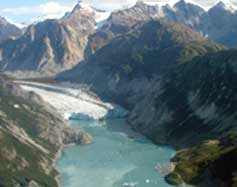Alaska: Southeast
Alaska: Southeast
Southeast Alaska has attributed the recent high variability and low predictability of their weather to climate
change. Sometimes warm winters plague the area; other times, cold fronts prevail. These increasingly fluctuating
weather patterns affect human residents and might also have an affect on marine and terrestrial life in the
region.
Halibut, crab, and all species of salmon are drastically declining. Historical salmon runs seem to be diminishing,
which impacts the subsistence of residents, spurring an increase in the consumption of store-bought foods (many
of which are less compatible with the natural diets of Native residents).
Predicting seasonal salmon harvesting has been difficult- some years yield a fair amount, while others result
in low numbers. Furthermore, different species of fish (and birds) are appearing in the area for the first time.
Invasive plant species are also emerging; communities such as Klawock have implemented plant-pulling projects to
deter invasions of non-native species.
 Glaciers have been receding at a rapid pace. According to locals the past 10-15 years have seen an extreme
recession that some estimate at almost 1 mile.
Glaciers have been receding at a rapid pace. According to locals the past 10-15 years have seen an extreme
recession that some estimate at almost 1 mile.